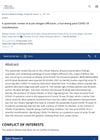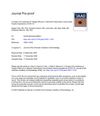Proceedings of the II National Academic Congress of Dermatology
January 2022
telogen effluvium Ruxolitinib vitiligo Mohs micrographic surgery high-frequency ultrasound immunotherapy probiotics prebiotics atopic dermatitis melanoma sun protection TE Ruxolitinib cream skin cancer surgery ultrasound in cosmetics immune therapy skin probiotics skin prebiotics eczema skin cancer UV protection

TLDR Ruxolitinib cream shows promise for vitiligo, and early melanoma diagnosis is crucial.
The document from the II Congresso Nacional Acadêmico de Dermatologia reviewed various dermatological topics, including the increased incidence of telogen effluvium (TE) during the COVID-19 pandemic, particularly in severe cases. It discussed the promising use of Ruxolitinib 1.5% cream for vitiligo, highlighting its potential for repigmentation with minimal side effects. The efficacy of Mohs micrographic surgery for skin cancer was emphasized, along with the role of high-frequency ultrasound in cosmetic procedures. The document also noted the potential of immunotherapy for metastatic Merkel cell carcinoma and the benefits of probiotics and prebiotics for atopic dermatitis. Additionally, it addressed skin conditions in health workers during the pandemic and the importance of early melanoma diagnosis and sun protection.










